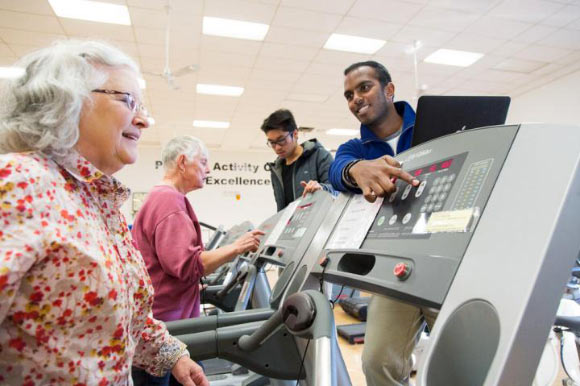High-intensity interval training results in the greatest memory performance in inactive older adults compared to moderate training or stretching, according to new research from McMaster University.

McMaster undergraduate student Ronald Perinpanayagam works with one of the seniors who participated in the study. Image credit: Paulina Rzeczkowska.
“There is urgent need for interventions that reduce dementia risk in healthy older adults,” said study senior author Dr. Jennifer Heisz, a researcher in the Department of Kinesiology at McMaster University.
“Only recently have we begun to appreciate the role that lifestyle plays, and the greatest modifying risk factor of all is physical activity.”
“This work will help to inform the public on exercise prescriptions for brain health so they know exactly what types of exercises boost memory and keep dementia at bay.”
The study involved 64 sedentary but otherwise healthy older adults (60-88 years old) who were monitored over a 12-week period and participated in three sessions per week.
Some performed high-intensity interval training (HIIT) or moderate-intensity continuous training (MICT) while a separate control group engaged in stretching only.
The HIIT protocol included four sets of high-intensity exercise on a treadmill for four minutes, followed by a recovery period.
The MICT protocol included one set of moderate-intensity aerobic exercise for nearly 50 min.
To capture exercise-related improvements in memory, Dr. Heisz and colleagues used a specific test that taps into the function of the newborn neurons generated by exercise which are more active than mature ones and are ideal for forming new connections and creating new memories.
They found older adults in the HIIT group had a substantial increase in high-interference memory compared to the MICT or control groups. This form of memory allows us to distinguish one car from another of the same make or model, for example.
The scientists also found that improvements in fitness levels directly correlated with improvement in memory performance.
“It’s never too late to get the brain health benefits of being physically active, but if you are starting late and want to see results fast, our research suggests you may need to increase the intensity of your exercise,” Dr. Heisz said.
“It is important to tailor exercise to current fitness levels, but adding intensity can be as simple as adding hills to a daily walk or increasing pace between street lamps.”
“Exercise is a promising intervention for delaying the onset of dementia. However, guidelines for effective prevention do not exist. Our hope is this research will help form those guidelines.”
The findings were published in the journal Applied Physiology, Nutrition and Metabolism.
_____
Ana Kovacevic et al. The effects of aerobic exercise intensity on memory in older adults. Applied Physiology, Nutrition, and Metabolism, published online October 30, 2019; doi: 10.1139/apnm-2019-0495







